Introduction to English learning
人教高中英语2023新教材目录
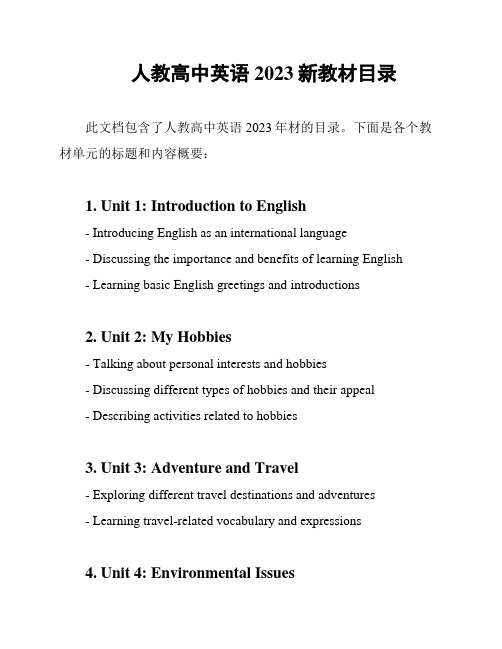
人教高中英语2023新教材目录此文档包含了人教高中英语2023年材的目录。
下面是各个教材单元的标题和内容概要:1. Unit 1: Introduction to English- Introducing English as an international language- Discussing the importance and benefits of learning English- Learning basic English greetings and introductions2. Unit 2: My Hobbies- Talking about personal interests and hobbies- Discussing different types of hobbies and their appeal- Describing activities related to hobbies3. Unit 3: Adventure and Travel- Exploring different travel destinations and adventures- Learning travel-related vocabulary and expressions4. Unit 4: Environmental Issues- Raising awareness about environmental problems- Discussing solutions and actions to protect the environment- Learning vocabulary related to environmental issues5. Unit 5: Cultural Diversity- Understanding and appreciating cultural diversity- Discussing different cultures and traditions- Learning vocabulary related to cultural diversity7. Unit 7: Globalization and Economy- Understanding the concept of globalization- Discussing the effects of globalization on the economy- Learning vocabulary related to globalization and economy8. Unit 8: Health and Well-being- Promoting a healthy lifestyle- Discussing different aspects of physical and mental well-being - Learning vocabulary related to health and well-being9. Unit 9: Career and Future Plans- Exploring career options and aspirations- Discussing future plans and goals- Learning vocabulary related to careers and future plans10. Unit 10: Literature and Art- Appreciating different forms of literature and art- Discussing famous literary works and artists- Learning vocabulary related to literature and art以上是人教高中英语2023年新教材的目录及其内容概要。
大学生英语教材第一册
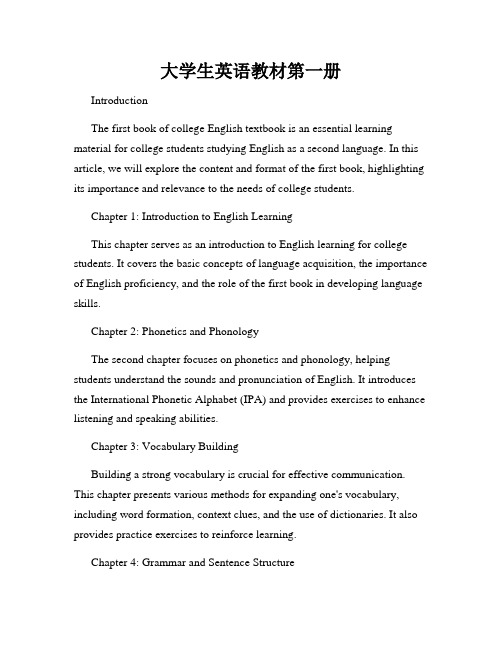
大学生英语教材第一册IntroductionThe first book of college English textbook is an essential learning material for college students studying English as a second language. In this article, we will explore the content and format of the first book, highlighting its importance and relevance to the needs of college students.Chapter 1: Introduction to English LearningThis chapter serves as an introduction to English learning for college students. It covers the basic concepts of language acquisition, the importance of English proficiency, and the role of the first book in developing language skills.Chapter 2: Phonetics and PhonologyThe second chapter focuses on phonetics and phonology, helping students understand the sounds and pronunciation of English. It introduces the International Phonetic Alphabet (IPA) and provides exercises to enhance listening and speaking abilities.Chapter 3: Vocabulary BuildingBuilding a strong vocabulary is crucial for effective communication. This chapter presents various methods for expanding one's vocabulary, including word formation, context clues, and the use of dictionaries. It also provides practice exercises to reinforce learning.Chapter 4: Grammar and Sentence StructureChapter four delves into the fundamentals of English grammar and sentence structure. It covers parts of speech, verb tenses, sentence patterns, and common grammatical errors. The chapter provides comprehensive explanations and exercises to improve grammatical accuracy.Chapter 5: Reading and ComprehensionDeveloping reading skills is essential for understanding written English. This chapter introduces different reading strategies, such as skimming, scanning, and inferencing. It includes a variety of texts, such as news articles, essays, and short stories, to enhance comprehension skills.Chapter 6: Writing SkillsWriting skills are crucial for academic and professional success. This chapter focuses on various writing elements, including organizing ideas, constructing paragraphs, and developing argumentative essays. It also provides guidance on proper grammar and vocabulary usage in writing.Chapter 7: Listening and SpeakingEffective listening and speaking skills are essential for communication in both academic and social settings. This chapter provides listening materials, such as dialogues and speeches, to enhance comprehension. It also offers speaking activities to improve fluency and pronunciation.Chapter 8: Cultural InsightsUnderstanding cultural differences plays a significant role in effective communication. This chapter explores cultural topics to promote intercultural competence among students. It discusses cultural aspects suchas greetings, gestures, and traditions, providing students with a broader cultural understanding.ConclusionThe first book of the college English textbook is a comprehensive guide for college students to develop their English language skills. With its diverse content, well-structured lessons, and ample opportunities for practice, it equips students with the necessary tools to succeed in their English learning journey. By mastering the material in this book, college students will be well-prepared to communicate confidently and effectively in English-speaking environments.。
新模式英语教案唐义均技工院校公共课

新模式英语教案唐义均技工院校公共课Title: New Mode English Teaching Plan for Tang Yijun Vocational InstituteIntroduction:Tang Yijun Vocational Institute is a technical school located in China, aiming to provide high-quality education for students who wish to pursue careers in various technical fields. In order to improve the English language skills of the students, a new mode English teaching plan has been developed to enhance the effectiveness of language learning.Objectives:1. To improve students' English language proficiency in listening, speaking, reading, and writing.2. To enhance students' communicative competence in English.3. To increase students' confidence in using English inreal-life situations.4. To develop students' critical thinking and problem-solving skills through English language activities.New Mode English Teaching Plan:Week 1: Introduction to English Language Learning- Ice-breaking activities to build rapport among students and teachers- Diagnostic test to assess students' current English language proficiency- Setting learning goals and expectations for the courseWeek 2-4: Listening and Speaking Skills Development- Listening comprehension activities using authentic materials like podcasts, TED talks, and news broadcasts- Speaking practice through role-plays, debates, and group discussions- Peer feedback and self-assessment to improve speaking skillsWeek 5-7: Reading and Writing Skills Enhancement- Reading comprehension exercises using articles, short stories, and academic texts- Writing practice including essays, reports, and emails- Grammar and vocabulary activities to improve writing skillsWeek 8-10: Communicative Competence and Real-Life Applications- Project-based learning activities where students apply English language skills in real-life situations- Presentations on topics of interest to develop public speaking skills- Field trips and cultural exchanges to practice English in authentic settingsWeek 11-12: Evaluation and Reflection- Formative assessment to evaluate students' progress in English language proficiency- Feedback sessions to provide constructive criticism and suggestions for improvement- Reflection on the learning process and setting goals for future language developmentConclusion:The new mode English teaching plan for Tang Yijun Vocational Institute aims to provide a comprehensive and engaging learning experience for students. By focusing on developing all four language skills and fostering communicativecompetence, students will be better equipped to succeed in their future careers. Through a combination of traditional and innovative teaching methods, this plan seeks to maximize the potential of students and create a supportive learning environment for English language acquisition.。
english in mind u1课文
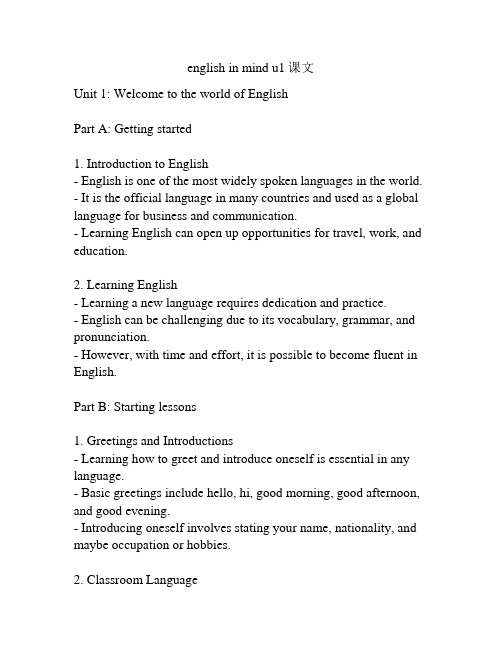
english in mind u1课文Unit 1: Welcome to the world of EnglishPart A: Getting started1. Introduction to English- English is one of the most widely spoken languages in the world. - It is the official language in many countries and used as a global language for business and communication.- Learning English can open up opportunities for travel, work, and education.2. Learning English- Learning a new language requires dedication and practice.- English can be challenging due to its vocabulary, grammar, and pronunciation.- However, with time and effort, it is possible to become fluent in English.Part B: Starting lessons1. Greetings and Introductions- Learning how to greet and introduce oneself is essential in any language.- Basic greetings include hello, hi, good morning, good afternoon, and good evening.- Introducing oneself involves stating your name, nationality, and maybe occupation or hobbies.2. Classroom Language- Classroom language helps students communicate effectively with their teachers and peers.- Common phrases include asking for clarification, permission, or help, as well as expressing understanding or not understanding. Part C: Meeting people1. Meeting New People- Meeting new people is a great opportunity to practice English and make new friends.- Common conversation topics include asking about someone's name, nationality, interests, and background.- It is important to be polite, use appropriate greetings, and listen actively during conversations.2. Making Small Talk- Small talk helps build relationships and establish rapport with others.- Topics for small talk can include the weather, current events, hobbies, or favorite movies or books.- Active listening and asking follow-up questions are key to engaging in meaningful small talk.Part D: Talking about yourself1. Talking about Hobbies and Interests- Sharing your hobbies and interests helps others get to know you better.- Vocabulary related to hobbies, such as sports, music, or cooking, can be used to express preferences or experiences.- Talking about hobbies can lead to discovering shared interests and engaging in further conversation.2. Talking about Family- Discussing family members and relationships is a common topic in conversations.- Vocabulary related to family, such as parents, siblings, or cousins, can be used to describe one's own family.- Sharing stories or experiences about family can create a sense of connection and understanding.Note: This overview provides a general idea of the content included in the English in Mind U1 course. The actual text may vary slightly.。
英语培训课件

英语培训课件英语培训课件(English Trning PowerPoint Presentation)1. Introduction to English Language Learning- Importance of English language- Benefits of learning English- Different learning approaches2. Basic English Grammar- Sentence structure- Parts of speech- Verb tenses- Articles and pronouns3. Vocabulary Building- Word formation- Synonyms and antonyms- Idioms and expressions- Prefixes and suffixes4. Reading Comprehension- Strategies for improving reading skills - Understanding mn ideas and detls- Text analysis and interpretation5. Listening and Speaking Skills- Listening comprehension exercises- Speaking practice and role plays- Pronunciation and intonation6. Writing Skills- Essay writing techniques- Formal and informal writing styles- Grammar and sentence structure in writing7. Test Preparation- Tips for TOEFL/IELTS exams- Practice exercises and mock tests- Time management strategies8. Cultural Awareness- Understanding different English-speaking cultures- Cultural norms and etiquette- Cross-cultural communication skills9. Business English- Vocabulary and phrases for business communication- Writing professional emls and letters- Presentation skills for meetings and conferences10. Interactive Activities and Games- Group discussion and debates- Vocabulary games and quizzes- Role plays and skits以上是一个典型的英语培训课件的内容大纲,可以根据具体培训需求进行调整和修改。
《英语学习》课件

Benefits of English Fluency
Explore the advantages of being proficient in the English language.
Business Negotiation SkillRsesume and Cover
Develop strategies for
Letter Writing
successful negotiations in
Create persuasive resumes
English.
and cover letters to impress
forms.
3
Common Word Patterns
Discover common word combinations and collocations to enhance your vocabulary.
Pronunciation and phonetics
Phonetic Symbols
Learn the International Phonetic Alphabet (IPA) to improve your pronunciation.
2
Writing Structure and Organization
Learn how to structure essays, reports, and other written assignments effectively.
3
Grammar for Writing
Explore grammar rules and guidelines to enhance your writing skills.
英语词汇学慕课
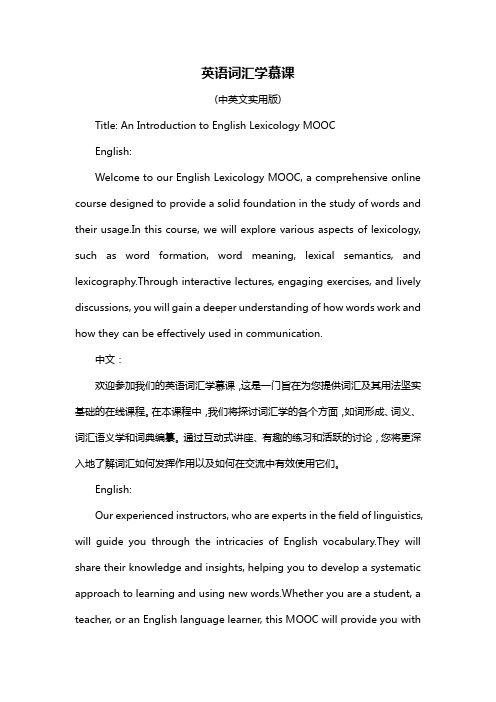
英语词汇学慕课(中英文实用版)Title: An Introduction to English Lexicology MOOCEnglish:Welcome to our English Lexicology MOOC, a comprehensive online course designed to provide a solid foundation in the study of words and their usage.In this course, we will explore various aspects of lexicology, such as word formation, word meaning, lexical semantics, and lexicography.Through interactive lectures, engaging exercises, and lively discussions, you will gain a deeper understanding of how words work and how they can be effectively used in communication.中文:欢迎参加我们的英语词汇学慕课,这是一门旨在为您提供词汇及其用法坚实基础的在线课程。
在本课程中,我们将探讨词汇学的各个方面,如词形成、词义、词汇语义学和词典编纂。
通过互动式讲座、有趣的练习和活跃的讨论,您将更深入地了解词汇如何发挥作用以及如何在交流中有效使用它们。
English:Our experienced instructors, who are experts in the field of linguistics, will guide you through the intricacies of English vocabulary.They will share their knowledge and insights, helping you to develop a systematic approach to learning and using new words.Whether you are a student, a teacher, or an English language learner, this MOOC will provide you withvaluable skills and knowledge that can be applied to your studies or career.中文:我们的经验丰富的讲师是语言学领域的专家,他们将引导您深入英语词汇的复杂性。
专科大学英语教材完整版
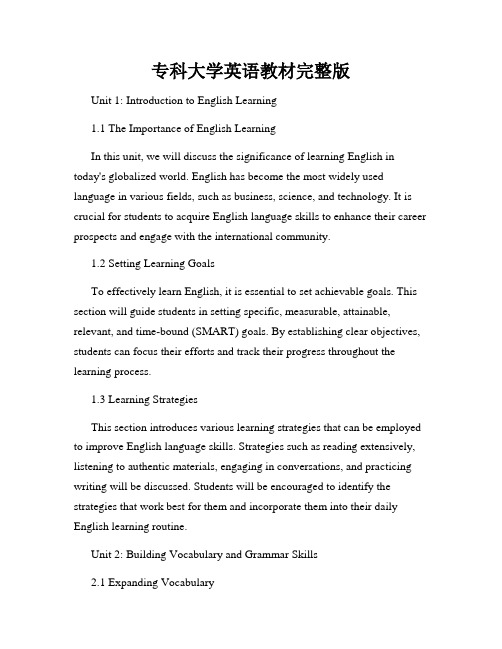
专科大学英语教材完整版Unit 1: Introduction to English Learning1.1 The Importance of English LearningIn this unit, we will discuss the significance of learning English in today's globalized world. English has become the most widely used language in various fields, such as business, science, and technology. It is crucial for students to acquire English language skills to enhance their career prospects and engage with the international community.1.2 Setting Learning GoalsTo effectively learn English, it is essential to set achievable goals. This section will guide students in setting specific, measurable, attainable, relevant, and time-bound (SMART) goals. By establishing clear objectives, students can focus their efforts and track their progress throughout the learning process.1.3 Learning StrategiesThis section introduces various learning strategies that can be employed to improve English language skills. Strategies such as reading extensively, listening to authentic materials, engaging in conversations, and practicing writing will be discussed. Students will be encouraged to identify the strategies that work best for them and incorporate them into their daily English learning routine.Unit 2: Building Vocabulary and Grammar Skills2.1 Expanding VocabularyIn this unit, students will learn effective strategies to expand their English vocabulary. It includes techniques such as reading extensively, using context clues, creating word associations, and utilizing online resources. Furthermore, students will be introduced to essential vocabulary related to common topics, such as education, travel, and technology.2.2 Understanding Grammar StructuresThis section focuses on the basic grammatical structures in English. Students will learn about parts of speech, sentence structures, verb tenses, and common grammatical errors to avoid. Through practice exercises, they will develop a solid foundation in English grammar and improve their overall language proficiency.2.3 Vocabulary and Grammar IntegrationThis unit emphasizes the integration of vocabulary and grammar skills. Students will learn how to apply their knowledge of grammar rules to construct grammatically correct sentences and use appropriate vocabulary. Practical exercises and communicative activities will be provided to reinforce their understanding and application of vocabulary and grammar in real-life situations.Unit 3: Developing Listening and Speaking Skills3.1 Improving Listening ComprehensionIn this unit, students will enhance their listening skills by engaging with various audio materials, such as dialogues, interviews, and speeches. They will practice active listening techniques, note-taking, and understanding different accents and intonations. Furthermore, strategies to improvelistening comprehension, such as predicting, summarizing, and inferring information, will be discussed.3.2 Enhancing Speaking FluencyThis section focuses on developing students' speaking fluency and accuracy. Through interactive speaking activities, such as role-plays, debates, and presentations, students will improve their spoken English skills. Emphasis will be placed on pronunciation, intonation, and effective communication strategies.3.3 Oral Communication in Real-life SituationsThis unit will provide opportunities for students to use their listening and speaking skills in real-life situations. They will engage in simulations of everyday conversations, such as ordering food in a restaurant, making phone calls, and participating in group discussions. Students will also learn effective strategies for overcoming communication barriers and developing cultural awareness.Unit 4: Reading and Writing Skills4.1 Developing Reading ComprehensionIn this unit, students will enhance their reading comprehension skills through a variety of authentic texts, such as newspaper articles, short stories, and academic passages. They will learn strategies to effectively skim, scan, and comprehend the main ideas and supporting details. Additionally, vocabulary expansion and inference skills will be emphasized.4.2 Enhancing Writing SkillsThis section focuses on improving students' writing skills in English. It covers different types of writing, including narratives, descriptive essays, argumentative essays, and formal letters. Students will learn how to structure their writing, develop coherent paragraphs, and effectively express their ideas. Furthermore, grammar and vocabulary usage in writing will be emphasized.4.3 Writing for Academic PurposesIn this unit, students will learn academic writing skills required for further studies. They will understand the structure of essays, research papers, and reports. Emphasis will be placed on critical thinking, conducting research, citing sources, and presenting arguments in an academic context.Conclusion:The comprehensive English textbook for specialized colleges provides a systematic approach to learning the English language. It covers the key aspects of English learning, including vocabulary, grammar, listening, speaking, reading, and writing skills. By following the content and engaging in the practice exercises, students will develop their language proficiency and achieve their learning goals.。
Introduction to English Learning

Leisure Time: Watch a Flash
We Graduated from Sichuan University
Part V English Learning Strategies
1 Computer-based Learning vs Traditional Learning 2 College English vs Middle School English 3 English vs Chinese 5 English and Your Life Goal 6 Some Misbelieves about English Learning 7 Experts’ Advice on How to Learn English 8 Practice Language Skills
3 Be Proud of LU
We, as one university student, can compete with any student from other universities in the world. We can be successful in the future if we work hard. We can become a scientist, we can become a professor, we can become a government worker, we can become a middle school teacher, we can become a lawyer, we can become a successful businessman……
2 The Goals of Learning English
We learn English
英文介绍英语的作文

英文介绍英语的作文Introduction to English。
English is a global language that is spoken by over 1.5 billion people worldwide. It is the official language of 53 countries and is widely used in international communication, business, science, and technology. English is also the most commonly taught second language in the world.The history of English dates back to the 5th century when Germanic tribes invaded Britain and brought with them their language, which eventually evolved into Old English. Over time, Old English was influenced by Latin and French, and Middle English emerged. The modern English language we know today began to take shape during the Renaissance period.English is a versatile language with a large vocabulary of over 170,000 words. It is a complex language with a variety of grammar rules and exceptions. English is alsoknown for its many idioms and expressions, which can be challenging for non-native speakers to understand.Learning English opens up a world of opportunities for individuals. It is the language of international business, and many companies require employees to have a good command of English. English is also the language of science and technology, and many scientific papers and research are published in English.In addition to its practical applications, English is also a language of culture and literature. Some of the greatest works of literature have been written in English, including the plays of William Shakespeare and the novels of Jane Austen and Charles Dickens.In conclusion, English is a vital language in today's globalized world. It is a language of communication, business, science, technology, and culture. Learning English can open up many doors and provide individuals with a competitive edge in the job market.。
用英语写一份英语学习计划
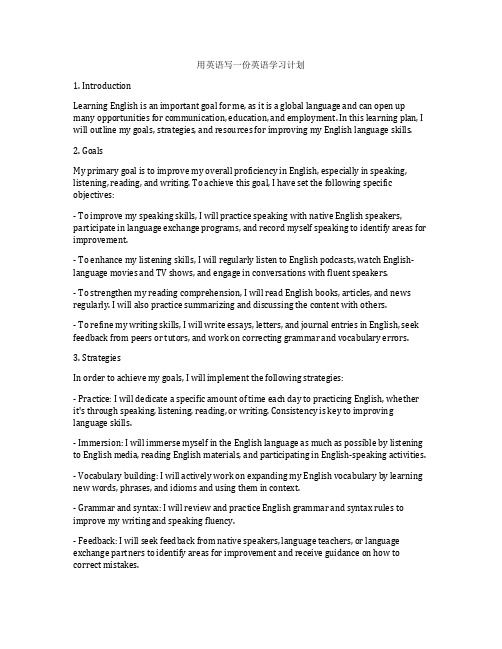
用英语写一份英语学习计划1. IntroductionLearning English is an important goal for me, as it is a global language and can open up many opportunities for communication, education, and employment. In this learning plan, I will outline my goals, strategies, and resources for improving my English language skills.2. GoalsMy primary goal is to improve my overall proficiency in English, especially in speaking, listening, reading, and writing. To achieve this goal, I have set the following specific objectives:- To improve my speaking skills, I will practice speaking with native English speakers, participate in language exchange programs, and record myself speaking to identify areas for improvement.- To enhance my listening skills, I will regularly listen to English podcasts, watch English-language movies and TV shows, and engage in conversations with fluent speakers.- To strengthen my reading comprehension, I will read English books, articles, and news regularly. I will also practice summarizing and discussing the content with others.- To refine my writing skills, I will write essays, letters, and journal entries in English, seek feedback from peers or tutors, and work on correcting grammar and vocabulary errors. 3. StrategiesIn order to achieve my goals, I will implement the following strategies:- Practice: I will dedicate a specific amount of time each day to practicing English, whether it's through speaking, listening, reading, or writing. Consistency is key to improving language skills.- Immersion: I will immerse myself in the English language as much as possible by listening to English media, reading English materials, and participating in English-speaking activities. - Vocabulary building: I will actively work on expanding my English vocabulary by learning new words, phrases, and idioms and using them in context.- Grammar and syntax: I will review and practice English grammar and syntax rules to improve my writing and speaking fluency.- Feedback: I will seek feedback from native speakers, language teachers, or language exchange partners to identify areas for improvement and receive guidance on how to correct mistakes.4. ResourcesTo support my language learning journey, I will utilize the following resources:- Language learning apps and websites: I will use language learning platforms such as Duolingo, Babbel, and Rosetta Stone to practice vocabulary, grammar, and speaking exercises.- Podcasts and audiobooks: I will listen to English-language podcasts and audiobooks to improve my listening skills and learn about various topics.- Movies and TV shows: I will watch English-language movies and TV shows with subtitles to improve my listening comprehension and to familiarize myself with colloquial language and accents.- Books and articles: I will read English books, news articles, and other written materials to enhance my reading and comprehension skills.- Language exchange programs: I will participate in language exchange programs to practice speaking with native English speakers and to help others learn my native language in return.5. Evaluation and AdaptationI will regularly evaluate my progress by assessing my language skills through self-assessment, language tests, and feedback from others. Based on my evaluation, I will adapt my learning plan by adjusting my goals, strategies, and resources to better suit my needs and to continue making progress.6. ConclusionIn conclusion, my English learning plan involves setting clear goals, implementing effective strategies, and utilizing various resources to improve my language skills. I am committed to dedicating time, effort, and perseverance to achieve my objectives and become proficient in English. I am excited about the journey ahead and look forward to seeing my language skills grow and develop over time.。
留学申请英语学习计划
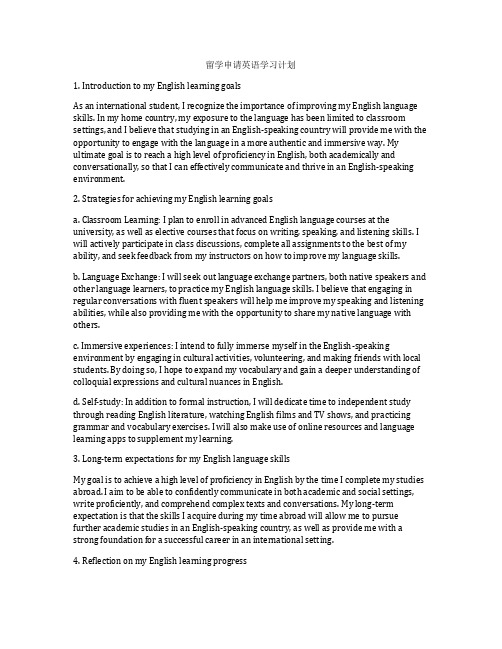
留学申请英语学习计划1. Introduction to my English learning goalsAs an international student, I recognize the importance of improving my English language skills. In my home country, my exposure to the language has been limited to classroom settings, and I believe that studying in an English-speaking country will provide me with the opportunity to engage with the language in a more authentic and immersive way. My ultimate goal is to reach a high level of proficiency in English, both academically and conversationally, so that I can effectively communicate and thrive in an English-speaking environment.2. Strategies for achieving my English learning goalsa. Classroom Learning: I plan to enroll in advanced English language courses at the university, as well as elective courses that focus on writing, speaking, and listening skills. I will actively participate in class discussions, complete all assignments to the best of my ability, and seek feedback from my instructors on how to improve my language skills.b. Language Exchange: I will seek out language exchange partners, both native speakers and other language learners, to practice my English language skills. I believe that engaging in regular conversations with fluent speakers will help me improve my speaking and listening abilities, while also providing me with the opportunity to share my native language with others.c. Immersive experiences: I intend to fully immerse myself in the English-speaking environment by engaging in cultural activities, volunteering, and making friends with local students. By doing so, I hope to expand my vocabulary and gain a deeper understanding of colloquial expressions and cultural nuances in English.d. Self-study: In addition to formal instruction, I will dedicate time to independent study through reading English literature, watching English films and TV shows, and practicing grammar and vocabulary exercises. I will also make use of online resources and language learning apps to supplement my learning.3. Long-term expectations for my English language skillsMy goal is to achieve a high level of proficiency in English by the time I complete my studies abroad. I aim to be able to confidently communicate in both academic and social settings, write proficiently, and comprehend complex texts and conversations. My long-term expectation is that the skills I acquire during my time abroad will allow me to pursue further academic studies in an English-speaking country, as well as provide me with a strong foundation for a successful career in an international setting.4. Reflection on my English learning progressI plan to regularly assess and reflect on my language learning progress by measuring my language proficiency through standardized tests such as the TOEFL or IELTS. I will also seek feedback from my instructors, language exchange partners, and peers on my language skills to identify areas for improvement and set new goals for myself. I understand that language learning is a continuous process, and I will remain committed to improving my English skills beyond the duration of my studies abroad.In conclusion, studying abroad presents an invaluable opportunity for me to enhance my English language skills by immersing myself in an English-speaking environment. By setting clear goals, employing effective strategies, and maintaining a persistent attitude towards self-improvement, I am confident that my time abroad will yield significant improvements in my language proficiency. I look forward to the challenges and rewards that come with this endeavor, and I am excited to see the positive impact my language learning experience will have on my personal and academic growth. Thank you for considering my study plan, and I am eager to embark on this journey of language enrichment and cultural exploration.。
未来英语学习计划英文介绍
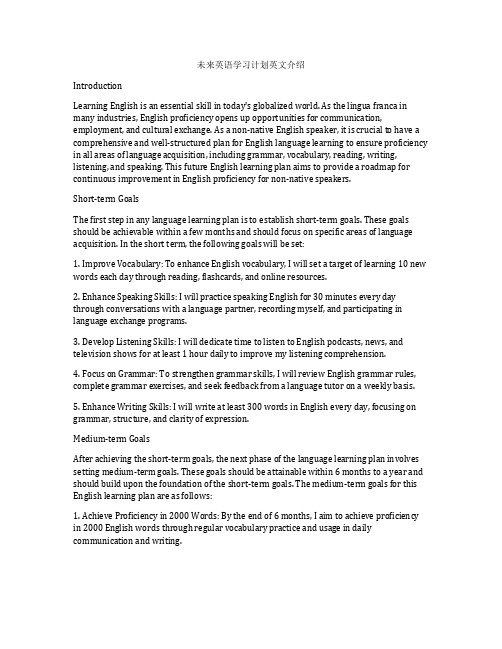
未来英语学习计划英文介绍IntroductionLearning English is an essential skill in today's globalized world. As the lingua franca in many industries, English proficiency opens up opportunities for communication, employment, and cultural exchange. As a non-native English speaker, it is crucial to have a comprehensive and well-structured plan for English language learning to ensure proficiency in all areas of language acquisition, including grammar, vocabulary, reading, writing, listening, and speaking. This future English learning plan aims to provide a roadmap for continuous improvement in English proficiency for non-native speakers.Short-term GoalsThe first step in any language learning plan is to establish short-term goals. These goals should be achievable within a few months and should focus on specific areas of language acquisition. In the short term, the following goals will be set:1. Improve Vocabulary: To enhance English vocabulary, I will set a target of learning 10 new words each day through reading, flashcards, and online resources.2. Enhance Speaking Skills: I will practice speaking English for 30 minutes every day through conversations with a language partner, recording myself, and participating in language exchange programs.3. Develop Listening Skills: I will dedicate time to listen to English podcasts, news, and television shows for at least 1 hour daily to improve my listening comprehension.4. Focus on Grammar: To strengthen grammar skills, I will review English grammar rules, complete grammar exercises, and seek feedback from a language tutor on a weekly basis.5. Enhance Writing Skills: I will write at least 300 words in English every day, focusing on grammar, structure, and clarity of expression.Medium-term GoalsAfter achieving the short-term goals, the next phase of the language learning plan involves setting medium-term goals. These goals should be attainable within 6 months to a year and should build upon the foundation of the short-term goals. The medium-term goals for this English learning plan are as follows:1. Achieve Proficiency in 2000 Words: By the end of 6 months, I aim to achieve proficiency in 2000 English words through regular vocabulary practice and usage in daily communication and writing.2. Participate in English Conversations: I will actively engage in English conversations with native speakers, language partners, or fellow learners to enhance my fluency and confidence in speaking.3. Comprehend English Media: By the end of the medium-term period, I aim to understand and comprehend English media, including news, movies, and podcasts, without difficulty.4. Write Clearly and Coherently: I will focus on expressing ideas clearly and coherently in written English, with a specific emphasis on organizing thoughts, using appropriate vocabulary, and employing correct grammar and punctuation.5. Pursue Language Certifications: I will prepare for internationally recognized English language certifications such as TOEFL, IELTS, or Cambridge exams to assess my language proficiency and establish goals for benchmark scores.Long-term GoalsBeyond the short and medium-term goals, long-term goals focus on reaching a high level of proficiency in English, mastering advanced language skills, and achieving fluency and accuracy in communication. The long-term goals for this English learning plan include:1. Attain Advanced Fluency: I aim to achieve advanced fluency and proficiency in English, including the ability to communicate effectively in professional and academic settings and handle complex language tasks.2. Develop Cultural Competence: In addition to language skills, I will focus on understanding English-speaking cultures, customs, and norms to enhance cross-cultural communication and adaptability.3. Academic and Professional Advancement: With a strong command of English, I plan to pursue academic studies, research, or career opportunities in English-speaking countries or multinational organizations.4. Teach and Share Knowledge: As a proficient English speaker, I aspire to teach and share my knowledge of the English language with others, whether through tutoring, volunteering, or language exchange programs.5. Continuous Improvement: Ultimately, the long-term goal is to maintain and continually improve language skills through lifelong learning, exposure to varied English language environments, and ongoing practice.Learning Strategies and ResourcesTo achieve the short-term, medium-term, and long-term goals outlined in this English learning plan, various learning strategies and resources will be employed. These include: 1. Language Classes and Tutors: Enrolling in language classes or hiring a private tutor to receive structured instruction, personalized feedback, and guided practice.2. Self-study: Utilizing online resources, language learning apps, grammar books, and vocabulary builders to enhance language skills independently.3. Immersion and Exposure: Seeking opportunities to immerse in English-speaking environments, such as living abroad, participating in language immersion programs, and traveling to English-speaking countries.4. Language Partners and Exchange Programs: Engaging in language exchange programs, conversation meetups, and online language communities to practice speaking and expand cultural understanding.5. Multimedia and Authentic Materials: Using a variety of multimedia resources, including movies, music, television shows, news articles, and literature, to enhance language skills and cultural awareness.6. Exam Preparation: Enrolling in preparation courses, practicing past exam papers, and seeking personalized guidance for English language certification exams.7. Feedback and Reflection: Seeking feedback on language proficiency, self-assessment, and reflective practice to identify areas for improvement and track progress over time. ConclusionIn summary, this future English learning plan provides a strategic framework for non-native English speakers to achieve proficiency and fluency in the English language. By setting short-term, medium-term, and long-term goals, employing diverse learning strategies and resources, and maintaining a proactive and dedicated approach to language learning, individuals can make significant progress in their English language skills. With continuous effort, practice, and engagement, this learning plan aims to equip learners with the language skills and cultural competence necessary for success in today's globalized world.。
英语作文向同学推荐英语学习程序
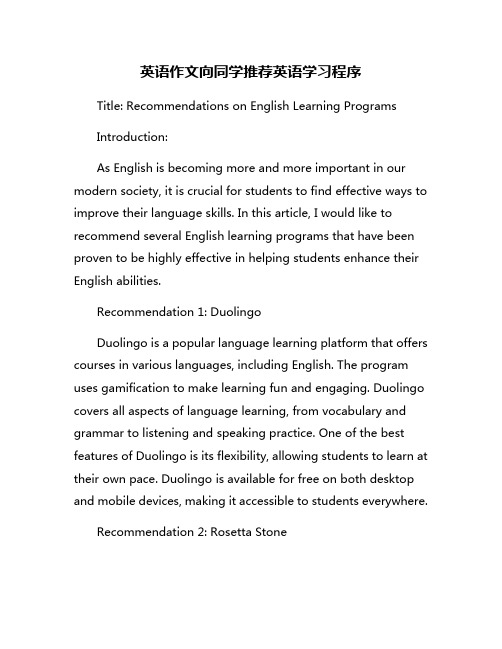
英语作文向同学推荐英语学习程序Title: Recommendations on English Learning ProgramsIntroduction:As English is becoming more and more important in our modern society, it is crucial for students to find effective ways to improve their language skills. In this article, I would like to recommend several English learning programs that have been proven to be highly effective in helping students enhance their English abilities.Recommendation 1: DuolingoDuolingo is a popular language learning platform that offers courses in various languages, including English. The program uses gamification to make learning fun and engaging. Duolingo covers all aspects of language learning, from vocabulary and grammar to listening and speaking practice. One of the best features of Duolingo is its flexibility, allowing students to learn at their own pace. Duolingo is available for free on both desktop and mobile devices, making it accessible to students everywhere.Recommendation 2: Rosetta StoneRosetta Stone is another well-known language learning program that has been used by millions of students around the world. The program is designed to immerse students in the language through interactive activities and exercises. Rosetta Stone focuses on improving students' listening and speaking skills, using a combination of visual and auditory cues. While Rosetta Stone is a paid program, many students find it worth the investment due to its effectiveness in language acquisition.Recommendation 3: FluentUFluentU is a unique language learning program that uses real-world videos, such as music videos, movie trailers, and news clips, to help students improve their language skills. Through immersive content, FluentU helps students learn vocabulary in context and practice listening comprehension. The program also offers interactive exercises and quizzes to reinforce learning. FluentU is available for a subscription fee, but many students find it to be a valuable resource for improving their English proficiency.Conclusion:In conclusion, these English learning programs offer students a variety of options to enhance their language skills in an engaging and effective way. By incorporating these programsinto their study routine, students can see significant improvement in their English abilities. Whether it's through gamified learning on Duolingo, immersive practice on Rosetta Stone, or real-world content on FluentU, students have access to a wealth of resources to support their language learning journey.I highly recommend trying out these programs to take your English skills to the next level.。
介绍英语学习方法初中冀教版英语演讲小作文
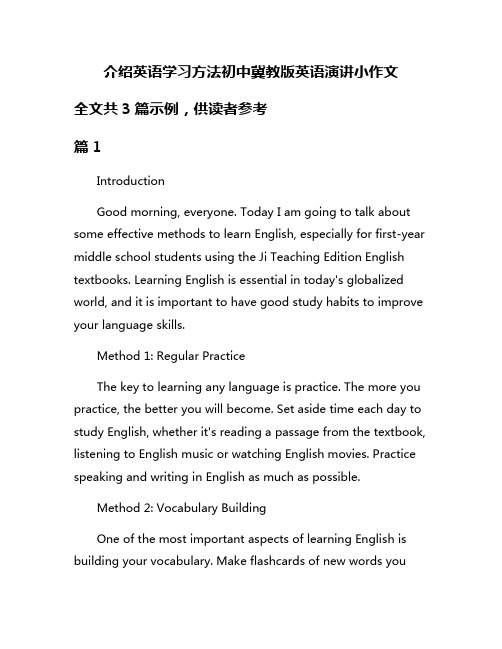
介绍英语学习方法初中冀教版英语演讲小作文全文共3篇示例,供读者参考篇1IntroductionGood morning, everyone. Today I am going to talk about some effective methods to learn English, especially for first-year middle school students using the Ji Teaching Edition English textbooks. Learning English is essential in today's globalized world, and it is important to have good study habits to improve your language skills.Method 1: Regular PracticeThe key to learning any language is practice. The more you practice, the better you will become. Set aside time each day to study English, whether it's reading a passage from the textbook, listening to English music or watching English movies. Practice speaking and writing in English as much as possible.Method 2: Vocabulary BuildingOne of the most important aspects of learning English is building your vocabulary. Make flashcards of new words youencounter in your textbooks and review them regularly. Use these new words in sentences to ensure you understand their meaning and how they are used in context.Method 3: Grammar PracticeGrammar is another crucial aspect of learning English. Make sure to understand basic grammar rules and practice them regularly. Complete exercises in your textbooks and review your mistakes to improve your grammar skills.Method 4: Listening and SpeakingListening and speaking are essential skills in learning a new language. Practice listening to English podcasts, songs, and videos to improve your listening skills. Take every opportunity to speak in English, whether it's with your classmates, teachers, or even practicing in front of a mirror.Method 5: Reading and WritingReading and writing are also important skills to develop in learning English. Read English books, articles, and newspapers to improve your reading comprehension. Practice writing essays, stories, and letters in English to enhance your writing skills.ConclusionIn conclusion, learning English can be challenging, but with the right methods and dedication, you can become proficient in the language. By following these effective study methods, you can improve your English skills and excel in your studies. Remember to practice regularly, build your vocabulary, practice grammar, improve your listening and speaking skills, and enhance your reading and writing abilities. Good luck on your English learning journey! Thank you.篇2Introduction to English Learning Methods for Junior Middle School Students in Jijiao EditionGood morning, everyone. Today I would like to share with you some effective methods for learning English as a junior middle school student using the Jijiao Edition. Learning English is not only important for academic purposes but also for communication and broadening your horizons. Here are some methods that can help you improve your English skills:1. Develop a daily reading habitReading English books, newspapers, magazines, and online articles is a great way to improve your vocabulary and comprehension skills. Start with simple texts and gradually moveon to more complex ones. In the Jijiao Edition, there are many interesting stories and articles that can help you practice your reading skills.2. Practice speaking and listeningIt is important to practice speaking and listening skills regularly to improve your fluency in English. You can watch English movies and TV shows, listen to English songs, and participate in English conversations with your classmates. The Jijiao Edition also provides audio materials that you can listen to and practice speaking.3. Use flashcards for vocabulary memorizationOne effective way to memorize English vocabulary is to use flashcards. Write the English word on one side and the Chinese translation on the other side. You can carry these flashcards with you and review them whenever you have free time. The Jijiao Edition provides vocabulary lists and exercises that can help you expand your vocabulary.4. Seek help from teachers and classmatesDon't hesitate to ask your English teachers for help when you encounter difficulties in learning English. You can also practice English with your classmates and participate in groupactivities to enhance your language skills. The Jijiao Edition includes interactive exercises and group projects that can help you practice English in a fun and engaging way.In conclusion, learning English can be challenging but with the right methods and practice, you can improve your English skills and become fluent in the language. Remember to be consistent in your efforts and never give up. I hope these tips will help you in your English learning journey. Thank you for listening.篇3Title: Introduction to English Learning Methods in Junior High School Jijing EditionGood morning, everyone. Today, I'd like to talk about some effective English learning methods for junior high school students using the Jijing edition textbook.To begin with, it is essential to have a strong foundation in English grammar. The Jijing edition textbook provides comprehensive grammar explanations and exercises to help students understand the rules and structures of the English language. By practicing grammar exercises regularly, students can improve their writing and speaking skills.Secondly, vocabulary acquisition is key to improving English proficiency. The Jijing edition textbook includes a wide range of vocabulary exercises and activities to help students expand their word bank. It is important for students to learn new words and phrases every day and use them in context to remember them better.In addition, reading is a crucial aspect of English learning. The Jijing edition textbook contains interesting stories, articles, and dialogues that help students develop their reading comprehension skills. By reading regularly, students can improve their vocabulary, grammar, and understanding of different writing styles.Furthermore, listening and speaking practice are essential for language learning. The Jijing edition textbook includes audio materials and speaking activities to help students improve their listening and speaking skills. It is important for students to listen to English songs, watch English movies, and practice speaking with their classmates or teachers to enhance their communication skills.Lastly, writing is an important skill that students need to develop. The Jijing edition textbook provides writing tasks and prompts to help students practice various writing styles, such asessays, letters, and reports. By writing regularly, students can improve their grammar, vocabulary, and organization of ideas.In conclusion, the Jijing edition textbook offers a variety of resources and activities to help junior high school students learn English effectively. By focusing on grammar, vocabulary, reading, listening, speaking, and writing, students can improve their English proficiency and achieve success in their language learning journey. Thank you for listening.。
写作业打卡英语
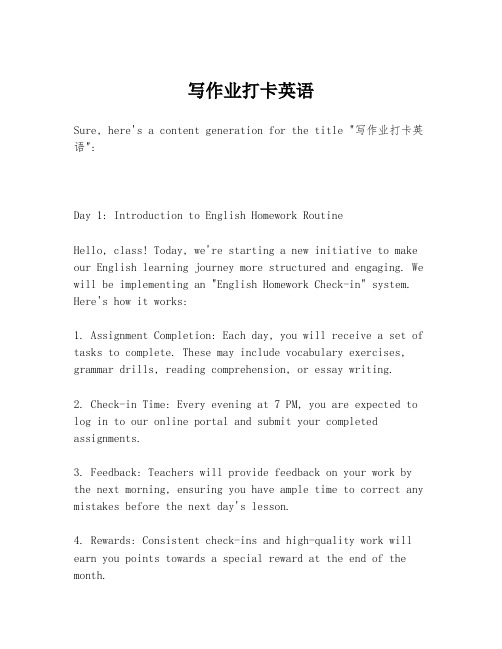
写作业打卡英语Sure, here's a content generation for the title "写作业打卡英语":Day 1: Introduction to English Homework RoutineHello, class! Today, we're starting a new initiative to make our English learning journey more structured and engaging. We will be implementing an "English Homework Check-in" system. Here's how it works:1. Assignment Completion: Each day, you will receive a set of tasks to complete. These may include vocabulary exercises, grammar drills, reading comprehension, or essay writing.2. Check-in Time: Every evening at 7 PM, you are expected to log in to our online portal and submit your completed assignments.3. Feedback: Teachers will provide feedback on your work by the next morning, ensuring you have ample time to correct any mistakes before the next day's lesson.4. Rewards: Consistent check-ins and high-quality work will earn you points towards a special reward at the end of the month.Remember, consistency is key to mastering a language. Let's make this a habit and watch our English skills soar!Day 7: Vocabulary MasteryToday's focus is on expanding your vocabulary. Here's your task:1. New Words: Learn and understand the meaning of 10 new English words provided in the list.2. Usage: Write sentences using each of these words to demonstrate your understanding.3. Check-in: Submit your sentences via the online portal by 7 PM.4. Peer Review: Tomorrow, you will review a peer's work and provide constructive feedback.Vocabulary is the building block of language proficiency.Let's build our language house brick by brick!Day 14: Grammar ApplicationIt's time to put our grammar lessons into practice:1. Grammar Focus: Today, we're focusing on the correct use of articles (a, an, the).2. Exercise: Complete the exercises provided to ensure youcan correctly apply articles in sentences.3. Creative Writing: Write a short paragraph using the new grammar rules.4. Check-in: Submit your exercises and paragraph by the deadline.Grammar is the skeleton that holds our language together.Let's strengthen our language structure!Day 21: Reading ComprehensionReading is a gateway to understanding and absorbing language:1. Article: Read the provided article on an interesting topic.2. Comprehension Questions: Answer the questions based on the article to test your understanding.3. Reflection: Write a short reflection on what you learned from the article.4. Check-in: Submit your answers and reflection by 7 PM.Reading not only improves your language skills but also broadens your horizons. Let's explore new worlds through reading!Day 28: Essay WritingThe culmination of our month-long journey:1. Topic: Choose a topic that interests you and write an essay.2. Structure: Ensure your essay has a clear introduction, body, and conclusion.3. Check-in: Submit your essay by the deadline.4. Celebration: We will review and celebrate the essays, and the best ones will be featured in our class newsletter.Essay writing is a powerful tool for expressing your thoughts and ideas. Let's put our best foot forward and make our voices heard!This structured approach to homework not only helps in tracking progress but also ensures that learning is acontinuous and enjoyable process. Keep up the great work, and let's make every day count in our English learning journey!。
susan教英语 文本

susan教英语文本Unit 1: Introduction to English LearningWelcome to the world of English learning with Susan! In this unit, we will lay the foundation for your journey towards mastering the English language.1.1 Why Learn English?English is one of the most widely spoken languages in the world. Whether you want to further your education, enhance your career prospects, or simply communicate with people from different cultures, learning English is essential.1.2 Benefits of English LearningLearning English has numerous benefits. It opens up a world of opportunities, allows you to access a wealth of information, and broadens your cultural horizons. Additionally, it enhances your cognitive abilities, boosts your confidence, and improves your communication skills.1.3 Setting GoalsTo make the most of your English learning journey, it is crucial to set clear goals. Whether you aim to pass a language proficiency test, communicate fluently in English, or simply improve your writing skills, setting goals will keep you motivated and focused.1.4 Language Learning StrategiesIn this section, we will explore effective language learning strategies. From creating a conducive learning environment to practicing regularly and using a variety of resources, we will provide you with practical tips to maximize your learning potential.1.5 Overcoming ChallengesLearning a new language can be challenging at times, but don't worry! Susan will guide you through the hurdles you might encounter. From dealing with grammar difficulties to overcoming pronunciation obstacles, we will address common challenges and provide strategies for overcoming them.1.6 ConclusionIn Unit 1, we have introduced the importance and benefits of learning English, emphasized the need for setting goals, explored effective language learning strategies, and discussed ways to overcome challenges. As you move forward in your English learning journey, remember to stay motivated, be consistent in your efforts, and believe in your ability to succeed.Remember, Susan is here to support you every step of the way. Get ready to embark on an exciting adventure of mastering the English language!。
华时代大学英语教材答案
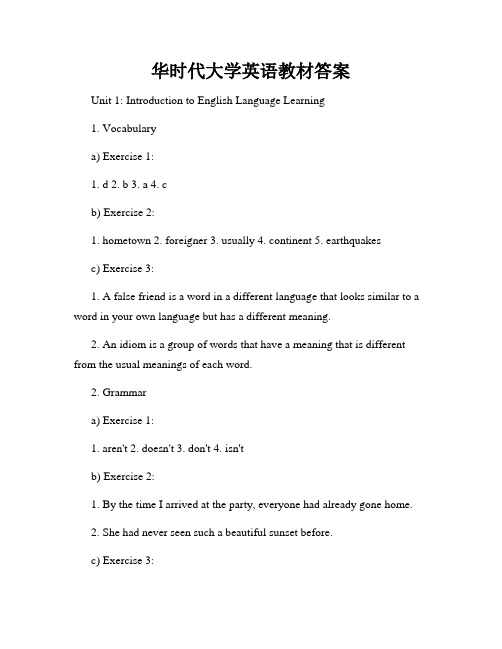
华时代大学英语教材答案Unit 1: Introduction to English Language Learning1. Vocabularya) Exercise 1:1. d2. b3. a4. cb) Exercise 2:1. hometown2. foreigner3. usually4. continent5. earthquakesc) Exercise 3:1. A false friend is a word in a different language that looks similar to a word in your own language but has a different meaning.2. An idiom is a group of words that have a meaning that is different from the usual meanings of each word.2. Grammara) Exercise 1:1. aren't2. doesn't3. don't4. isn'tb) Exercise 2:1. By the time I arrived at the party, everyone had already gone home.2. She had never seen such a beautiful sunset before.c) Exercise 3:1. is working2. loved3. have been playing3. Reading Comprehensiona) Exercise 1:1. False2. Not Given3. False4. True5. Trueb) Exercise 2:1. To improve their listening skills.2. There is a lot of variation in English pronunciation among speakers from different regions.c) Exercise 3:1. A2. C4. Writinga) Exercise 1:Dear Professor Johnson,I am writing to inform you that I will not be able to attend class next week due to a family emergency. I wanted to let you know in advance so that I can make arrangements to catch up on any missed work. Please let me know if there are any assignments or readings I should complete during my absence. I will make sure to collect any handouts or materials from a classmate upon my return.Thank you for your understanding.[Your Name]b) Exercise 2:Write a short paragraph describing your favorite hobby. Explain why you enjoy it and how it has impacted your life.My favorite hobby is painting. I find it incredibly relaxing and therapeutic. Whenever I have free time, I like to grab my paintbrushes and express my creativity on canvas. Painting allows me to escape from the stresses of everyday life and enter a peaceful state of mind. It has also helped me improve my focus and attention to detail. Furthermore, showcasing my artwork to others has given me a sense of accomplishment and boosted my self-confidence. Overall, painting has become an integral part of my life, bringing joy and fulfillment.Unit 2: Communication Skills1. Listeninga) Exercise 1:1. b2. a3. c4. bb) Exercise 2:1. Formal2. Casual3. Casual4. Formalc) Exercise 3:1. 9:30 am2. twice a week3. Orangea) Exercise 1:1. My daily routine usually involves waking up at 7 am, getting dressed, and having breakfast. Then, I head to work where I spend most of my day attending meetings and completing tasks. In the evening, I like to relax by reading a book or watching a movie. Before going to bed, I always make sure to plan the next day and set my alarm.b) Exercise 2:1. Can you tell me about your hometown?2. What are your favorite hobbies?c) Exercise 3:1. In my opinion, technology has greatly influenced communication in today's society. With the rise of smartphones and social media platforms, people can easily connect with others from all around the world. However, this reliance on technology has also resulted in a decrease in face-to-face interactions. Additionally, the brevity and informality of digital communication can sometimes lead to misunderstandings. Nonetheless, technology has undeniably made communication more convenient and efficient.3. Readinga) Exercise 1:1. True2. False3. True4. Not Given5. Falseb) Exercise 2:1. Headline: "Local Community Hosts Charity Event"Summary: A local community organized a charity event to raise funds for a children's hospital.2. Headline: "New Study Shows Benefits of Exercise"Summary: A recent study has revealed the numerous health benefits associated with regular exercise.c) Exercise 3:1. C2. A4. Writinga) Exercise 1:Write a formal email to your professor requesting an extension for an upcoming assignment.Dear Professor Anderson,I hope this email finds you well. I am writing to request a brief extension for the upcoming assignment due to unforeseen circumstances. Unfortunately, I have fallen ill and am currently unable to complete the assignment by the original deadline. I have attached the medical certificate for your reference.I understand the importance of timely submission and apologize for any inconvenience caused. I assure you that I will submit the assignment as soon as I have recovered. Your understanding and consideration are greatly appreciated.Thank you.Sincerely,[Your Name]b) Exercise 2:Write a short paragraph describing your dream vacation destination. Include details about the location, activities, and why it appeals to you.My dream vacation destination is Bora Bora, a small island in French Polynesia. Known for its crystal-clear turquoise waters and overwater bungalows, it is the epitome of paradise. I imagine spending my days swimming with exotic marine life, snorkeling in vibrant coral reefs, and basking in the sun on white sandy beaches. The natural beauty of the island, surrounded by lush tropical landscapes, is truly captivating. Additionally, the privacy and exclusivity offered by the luxurious resorts make it an ideal destination for relaxation and escape from the hustle and bustle of everyday life. Bora Bora is a place that embodies tranquility and serenity, and I cannot wait to experience its breathtaking beauty firsthand.(Note: The above content is a sample and may not accurately reflect the actual answers in the textbook. Please refer to the appropriate textbook for the correct answers.)。
英文初学入门教程

英文初学入门教程Introduction to English for BeginnersWelcome to the beginner's guide to learning English! In this tutorial, we will introduce you to the basics of the English language and help you get started on your journey to becoming fluent in English.1. Alphabet and Pronunciation:- Familiarize yourself with the English alphabet, consisting of 26 letters.- Learn the correct pronunciation of each letter and practice saying them out loud.2. Basic Vocabulary:- Begin by learning commonly used words and phrases, such as greetings, numbers, colors, and everyday objects.- Expand your vocabulary by learning new words through flashcards, online resources, or language learning apps.3. Grammar:- Get familiar with basic grammar rules, such as sentence structure, verb forms, tenses, and pronouns.- Study simple sentence patterns and practice constructingsentences using different grammar structures.4. Conversation Practice:- Engage in conversations with native English speakers or language exchange partners to improve your speaking skills.- Start with simple dialogues and gradually move on to more complex conversations as you gain confidence.5. Listening and Reading Comprehension:- Listen to English podcasts, watch movies or TV shows with English subtitles, and read beginner-level books to improve your listening and reading skills.- T ake note of new vocabulary and try to understand the context of what you are listening to or reading.6. Writing Skills:- Begin by practicing writing simple sentences and gradually progress to writing paragraphs and short essays.- Pay attention to grammar, punctuation, and sentence structure when writing.7. Practice Regularly:- Consistency is key to language learning. Set aside dedicated time each day to practice English.- Use language learning apps, online exercises, or find a study partner to keep your motivation high.Remember, learning a new language takes time and effort. Be patient with yourself and celebrate your progress along the way. With regular practice and dedication, you will gradually build your English skills and become more confident in using the language.Good luck on your English learning journey!。
英语学习计划怎么翻译
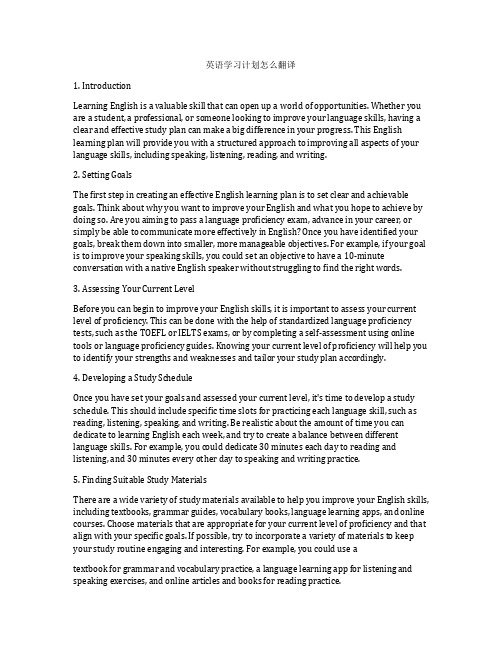
英语学习计划怎么翻译1. IntroductionLearning English is a valuable skill that can open up a world of opportunities. Whether you are a student, a professional, or someone looking to improve your language skills, having a clear and effective study plan can make a big difference in your progress. This English learning plan will provide you with a structured approach to improving all aspects of your language skills, including speaking, listening, reading, and writing.2. Setting GoalsThe first step in creating an effective English learning plan is to set clear and achievable goals. Think about why you want to improve your English and what you hope to achieve by doing so. Are you aiming to pass a language proficiency exam, advance in your career, or simply be able to communicate more effectively in English? Once you have identified your goals, break them down into smaller, more manageable objectives. For example, if your goal is to improve your speaking skills, you could set an objective to have a 10-minute conversation with a native English speaker without struggling to find the right words.3. Assessing Your Current LevelBefore you can begin to improve your English skills, it is important to assess your current level of proficiency. This can be done with the help of standardized language proficiency tests, such as the TOEFL or IELTS exams, or by completing a self-assessment using online tools or language proficiency guides. Knowing your current level of proficiency will help you to identify your strengths and weaknesses and tailor your study plan accordingly.4. Developing a Study ScheduleOnce you have set your goals and assessed your current level, it's time to develop a study schedule. This should include specific time slots for practicing each language skill, such as reading, listening, speaking, and writing. Be realistic about the amount of time you can dedicate to learning English each week, and try to create a balance between different language skills. For example, you could dedicate 30 minutes each day to reading and listening, and 30 minutes every other day to speaking and writing practice.5. Finding Suitable Study MaterialsThere are a wide variety of study materials available to help you improve your English skills, including textbooks, grammar guides, vocabulary books, language learning apps, and online courses. Choose materials that are appropriate for your current level of proficiency and that align with your specific goals. If possible, try to incorporate a variety of materials to keep your study routine engaging and interesting. For example, you could use atextbook for grammar and vocabulary practice, a language learning app for listening and speaking exercises, and online articles and books for reading practice.6. Practicing Listening and SpeakingListening and speaking are fundamental aspects of language learning, and regular practice is essential for improvement. To improve your listening skills, try to listen to a variety of English-language materials, such as podcasts, audiobooks, radio programs, and movies or TV shows with English subtitles. Make an effort to listen to different accents and speech patterns to improve your understanding of natural spoken English. To improve your speaking skills, find opportunities to engage in conversation with native English speakers, whether it's through language exchange programs, online conversation partners, or language learning meetups in your area.7. Improving Reading and WritingReading and writing are equally important skills for language learners, and there are many ways to practice and improve these skills. To improve your reading skills, try to read a variety of English-language materials, including books, articles, newspapers, and literature. Pay attention to vocabulary, grammar, and sentence structure, and try to analyze the style and tone of different authors to enhance your comprehension and critical thinking skills. To improve your writing skills, practice writing in English regularly, whether it's through journaling, blogging, or completing writing prompts. Seek feedback from native English speakers or language instructors to help you identify areas for improvement and refine your writing style.8. Seeking Feedback and SupportLastly, it's important to seek feedback and support from others to help you stay motivated and on track with your English learning plan. Joining a study group, attending language learning meetups, or working with a language tutor can provide you with valuable feedback, encouragement, and accountability. Don't be afraid to ask for help when you need it, and seek out opportunities to practice and apply your language skills in real-life situations.In conclusion, creating a structured and effective English learning plan can help you achieve your language learning goals and improve your overall proficiency. By setting clear goals, developing a study schedule, finding suitable study materials, and practicing all aspects of the language, you can make steady progress in your English learning journey. Remember to stay motivated, seek feedback and support, and most importantly, enjoy the process of learning and improving your English skills. Good luck!。
- 1、下载文档前请自行甄别文档内容的完整性,平台不提供额外的编辑、内容补充、找答案等附加服务。
- 2、"仅部分预览"的文档,不可在线预览部分如存在完整性等问题,可反馈申请退款(可完整预览的文档不适用该条件!)。
- 3、如文档侵犯您的权益,请联系客服反馈,我们会尽快为您处理(人工客服工作时间:9:00-18:30)。
笨得像猪 力大如牛 隔墙有耳
……
…
III. About the Integrated English Course.
1. What is the course like? 2. What you will learn in it? 3. How to learn this course?
china chess, watching movie, playing mahjong, playing ping pang, and etc.
▲The Students: The students make a brief self-introduction to the class, and try to make him/her) impressive by his/her) introduction.
A Brief Introduction to English Learning And the Course of Integrated English
教师:何嗣锋
I. Self Introduction
▲ The Teacher: 1. My name: 何嗣锋,English name: Saul 2. My age: 3. My Education: 4. My hobbies:reading,practicing calligraphy, playing
6. How to build your vocabulary, train your listening, reading, writing and translating?
1) read a lot, and try to remember the words you learnt in your text book; 2) Listen to a lot (CDs, MP3, Radio Program, etc.); 3) Write English dairy, Write something interesting down, write book/movie review…); 4) Try to practice translating regularly …(anyone may have your own method)
8. Pay much attention to culture shock!
Some Examples: Chinese
吃了吗?
贵姓/尊姓大名?
English
What’s up?/Hi/Hello/…
May I have your name, sir/madam?
过奖,过奖/哪里,哪里
Thank you (so much)
——You may choose a way you like to make your self Introduction
II. How to learn/study English well?
1. Do you like English? 1)And Why did you choose to be an English major if you say ―No‖.
7. An important Suggestion: try to think in English when you learn English. Do not always translate English into Chinese while do English Writing. Especially, when you write.
IV. About the final test
15% for attendance; 15% for exercises & quiz 10% for classroom performance 60% for the final examination
Total: 100%
I hope we cooperate well! And everybody of you will make a great progress and have a wonderful life here!
5. How to study English well?
1) Good pronunciation and intonation; 2) Build your vocabulary; 3) Read as much as you can; 4) Open your mouth to speak much– practice your speaking; 5) Listen to tape, teachers, radio programs, watch English movies and TV programs. And try to IMITATE. 6) Get a good DICTIONARY
Because English is your major and the most important course, you must attach much importance to it.
3. Why did you choose to study English?
1) Because of your parents’ advice; 2) Because of your teachers’ advice; 3) For a good job; 4) Because you want to learn/study the history/cultures and something else of the English Speaking countries; 5) For the basic skill (language skill) to study abroad; 6)(Just) for some examinations-PETS, CET(4,6), TEM(4,8) Tips: brief introduction to those test mentioned above. 7) Just because you like it; 8) Because English is so useful; 9) Other reasons:_______________________.
2)Try to let yourself like Englishnce you have become an English major, try to let yourself be ready to study hard whether you like or dislike English.
4. What are the basic skill of English (as a foreign language)?
1) Listening 2) Speaking 3) Reading 4)Writing 5) Translating
To communicate
To make you and others who speak English understand each other
What I request of you
Duty report; remember all the words &expressions in each Unit; try to get very familiar with each text in every Unit--to recite; while learning each unit, try to review what you have learnt in your high school, specially, the grammar; Try to be active in the class; try to contract a good habit;
The suggested clues to self introduction:
My name is ___,and my English name is __. I’m __ years old. I come from/ I’m from __ county/district. I Graduated from ____(middle School) I like _, _, _, _,and etc. I like _ most I don’t like _, I hate _.
